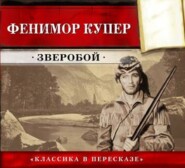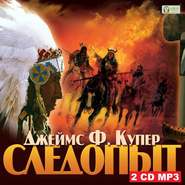По всем вопросам обращайтесь на: info@litportal.ru
(©) 2003-2024.
✖
The Spy: Condensed for use in schools
Настройки чтения
Размер шрифта
Высота строк
Поля
“All this may be very true; but the affair of André has made us on the alert. When treason reaches the grade of general officers, Captain Wharton, it behooves[47 - is the duty of.] the friends of liberty to be vigilant.”
Henry bowed to this remark in distant silence, but Sarah ventured to urge something in behalf of her brother. The dragoon heard her politely, and answered mildly:
“I am not the commander of the party, madam; Major Dunwoodie will decide what must be done with your brother. At all events, he will receive nothing but kind and gentle treatment. May I presume so far as to ask leave to dismount and refresh my men, who compose a part of his squadron?”
There was a manner about the trooper that would have made the omission of such a request easily forgiven by Mr. Wharton; but he was fairly entrapped by his own eagerness to conciliate, and it was useless to withhold a consent which he thought would probably be extorted; he therefore made the most of necessity, and gave such orders as would facilitate[48 - to make easy.] the wishes of Captain Lawton.
CHAPTER V.
DUNWOODIE’S INVESTIGATION
After sufficient time had passed to make a very comfortable meal, a trumpet suddenly broke on the ears of the party, sending its martial tones up the valley, in startling melody. The trooper rose instantly from the table, exclaiming:
“Quick, gentlemen, to your horses; there comes Dunwoodie;” and, followed by his officers, he precipitately[49 - very hastily.] left the room.
With the exception of the sentinels left to guard Captain Wharton, the dragoons mounted, and marched out to meet their comrades.
In the advancing troop, one horseman seemed to be distinguished in particular from those around him. Even the steed of this youthful soldier seemed to be conscious that he sustained the weight of no common man. The dragoon sat in the saddle with a firmness and ease that showed him master of himself and horse, his figure uniting the just proportions of strength and activity, being tall, round, and muscular. To this officer Lawton made his report, and side by side they rode into the field opposite to the cottage.
The officer gave a few hasty orders to his second in command, walked rapidly into the lawn, and approached the cottage. The dragoon ascended the steps of the piazza, and had barely time to touch the outer door, when it opened to his admission.
Frances silently led the way into a vacant parlor, opposite to the one in which the family were assembled, and turning to the soldier frankly, placing both her hands in his own, exclaimed:
“Ah, Dunwoodie, how happy on many accounts I am to see you! I have brought you in here to prepare you to meet an unexpected friend in the opposite room.”
“To whatever cause it may be owing,” cried the youth, pressing her hands to his lips, “I, too, am happy in being able to see you alone. Frances, the probation[50 - trial.] you have decreed is cruel; war and distance may separate us forever.”
“We must submit to the necessity which governs us. But it is not love speeches I would hear now: I have other and more important matter for your attention.”
“What can be of more importance than to make you mine by a tie that will be indissoluble![51 - never to be loosened.] Frances, you are cold to me – me – from whose mind, days of service and nights of alarm have never been able to banish your image for a single moment.”
“Dear Dunwoodie,” said Frances, softening nearly to tears, “you know my sentiments. This war once ended, and you may take my hand forever; but I cannot consent to tie myself to you by any closer union, so long as you are arrayed against my only brother. Even now, that brother is waiting your decision to restore him to liberty, or to conduct him to a probable death.”
“Your brother!” cried Dunwoodie, starting and turning pale; “Frances! what can I do?”
“Do!” she repeated, gazing at him wildly; “would Major Dunwoodie yield to his enemies his friend, the brother of his betrothed wife? Do you think I can throw myself into the arms of a man whose hands are stained with the blood of my only brother!”
“Frances, you wring my very heart; but, after all, we may be torturing ourselves with unnecessary fears, and Henry, when I know the circumstances, may be nothing more than a prisoner of war; in which case, I can liberate him on parole.”
Frances now led the way to the opposite room. Dunwoodie followed her reluctantly, and with forebodings of the result.
The salutations of the young men were cordial and frank, and, on the part of Henry Wharton, as collected as if nothing had occurred to disturb his self-possession.
After exchanging greetings with every member of the family, Major Dunwoodie beckoned to the sentinel to leave the room. Turning to Captain Wharton, he inquired mildly:
“Tell me, Henry, the circumstances of this disguise in which Captain Lawton reports you to have been found; and remember – remember – Captain Wharton, your answers are entirely voluntary.”
“The disguise was used by me, Major Dunwoodie,” replied the English officer, gravely, “to enable me to visit my friends without incurring the danger of becoming a prisoner of war.”
“But you did not wear it until you saw the troop of Lawton approaching?”
“Oh, no!” interrupted Frances, eagerly, “Sarah and myself placed them on him when the dragoons appeared; it was our awkwardness that led to the discovery.”
The countenance of Dunwoodie brightened, as, turning his eyes in fondness on the speaker, he listened to her explanation.
“Probably some articles of your own,” he continued, “which were at hand, and were used on the spur of the moment.”
“No,” said Wharton, with dignity; “the clothes were worn by me from the city; they were procured for the purpose to which they were applied, and I intended to use them again in my return this very day.”
“But the pickets – the party at the Plains?” added Dunwoodie, turning pale.
“I passed them, too, in disguise. I made use of this pass, for which I paid; and, as it bears the name of Washington, I presume it is forged.”
Dunwoodie caught the paper eagerly, and stood gazing on the signature for some time in silence, during which the soldier gradually prevailed over the man; then he turned to the prisoner with a searching look, as he asked:
“Captain Wharton, whence did you procure this paper?”
“This is a question, I conceive, Major Dunwoodie has no right to ask.”
“Your pardon, sir; my feelings may have led me into an impropriety. This name is no counterfeit. Captain Wharton, my duty will not suffer me to grant you a parole; you must accompany me to the Highlands.”
“I did not expect otherwise, Major Dunwoodie.”
“Major Dunwoodie,” said Frances, “I have already acknowledged to you my esteem; I have promised, Dunwoodie, when peace shall be restored to our country, to become your wife; give my brother his liberty on parole, and I will this day go with you to the altar, follow you to the camp, and, in becoming a soldier’s bride, learn to endure a soldier’s privations.”
Dunwoodie seized the hand which the blushing girl extended towards him, and pressed it for a moment to his bosom; he paced the room in excessive agitation.
“Frances, say no more, I conjure you, unless you wish to break my heart.”
“Then you reject my proffered hand?” she said, rising with dignity.
“Reject it! Have I not sought it with entreaties, with tears? But to take it under such conditions would be to dishonor both. Henry must be acquitted; perhaps not tried. No intercession of mine shall be wanting, you must well know; and believe me, Frances, I am not without favor with Washington.”
“That paper, that abuse of his confidence, will steel him to my brother’s case. If threats or entreaties could move his stern sense of justice, would André have suffered?” As Frances uttered these words, she fled from the room in despair.
Dunwoodie remained for a minute nearly stupefied; and then he followed with a view to vindicate[52 - free from blame.] himself, and to relieve her apprehensions. On entering the hall that divided the two parlors, he was met by a ragged boy, who looked one moment at his dress, and placing a piece of paper in his hands, immediately vanished through the outer door of the building. The soldier turned his eyes to the subject of the note. It was written on a piece of torn and soiled paper, and in a hand barely legible; but, after much labor, he was able to make out as follows:
“The rig’lars are at hand, horse and foot.”
Dunwoodie started; and, forgetting everything but the duties of a soldier, he precipitately left the house. While walking rapidly towards the troops, he noticed on a distant hill a vidette[53 - a mounted sentinel.] riding with speed; several pistols were fired in quick succession, and the next instant the trumpets of the corps rang in his ears with the enlivening strain of “To arms.” By this time he had reached the ground occupied by his squadron; the major saw that every man was in active motion. Lawton was already in the saddle, eying the opposite extremity of the valley with the eagerness of expectation.
CHAPTER VI.
THE SKIRMISH AND ESCAPE OF CAPTAIN WHARTON
The videttes and patrols now came pouring in, each making in succession his hasty report to the commanding officer, who gave his orders coolly and with a promptitude that made obedience certain.
Major Dunwoodie had received from his scouts all the intelligence concerning the foe which was necessary to enable him to make his arrangements. The bottom of the valley was an even plain, that fell with a slight inclination from the foot of the hills on either side to the level of a natural meadow that wound through the country on the banks of a small stream. This brook was easily forded, and the only impediment it offered to the movements of the horse was in a place where its banks were more steep and difficult of access than common. Here the highway crossed it by a rough wooden bridge.

















